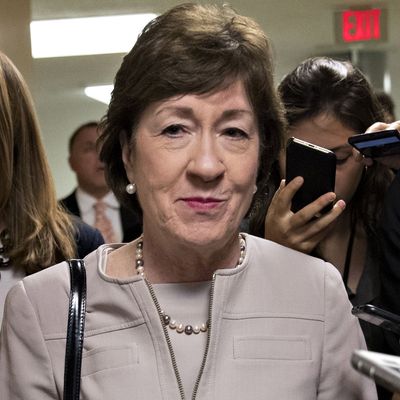
Senator Susan Collins of Maine said repeatedly that she would not announce her voting intentions on the Graham-Cassidy health-care measure until she had heard from the Congressional Budget Office. She was as good as her word: Minutes after CBO and the Joint Committee on Taxation delivered a bare-bones, virtually numberless “score” of the rapidly changing bill, Collins let it be known she would oppose it.
This was no surprise, since she’s opposed all of her party’s “repeal-and-replace Obamacare” bills, and in fact, was the one current Republican who voted against the 2015 “trial run” Obamacare repeal. But still, as crazy as the process has been this year, it was important that she registered the third firm GOP “no” to Graham-Cassidy (Rand Paul — who reiterated his opposition today — and John McCain came first).
For what it’s worth, the CBO “score” of Graham-Cassidy was thoroughly negative in tone despite its lack of numbers. It discussed three different features of the bill that would drive insurance coverage down significantly: Medicaid cuts, abolition of insurance purchasing tax credits, and abolition of the individual and employer mandates. CBO also addressed the most distinctive feature of the bill: its disruptive nature.
The decrease in the number of insured people would be particularly large starting in 2020, when the legislation would make major changes to federal funding for Medicaid and the nongroup market. CBO and JCT expect that market disruptions and other implementation problems would accompany the transition to the block grants created by the legislation—despite the availability of funding specifically designated to assist with that transition—given the short time for planning and making changes between now and then.
Yeah, that was more than enough for Collins to say a definite “no,” when added to what she already knew.
One would normally declare the Graham-Cassidy bill dead at this juncture, since it’s not getting 50 Senate votes before September 30, when the budget resolution authorizing this bill expires, according to the Senate parliamentarian.
But it should be noted that Lindsey Graham has suddenly started talking about taking his new obsession with Obamacare repeal beyond the deadline by horning in on the new, FY 2018 budget resolution that has been reserved for tax legislation. And Bill Cassidy is talking about carrying on the fight as well. For the present, their handiwork is no longer alive, even if it never dies.






























